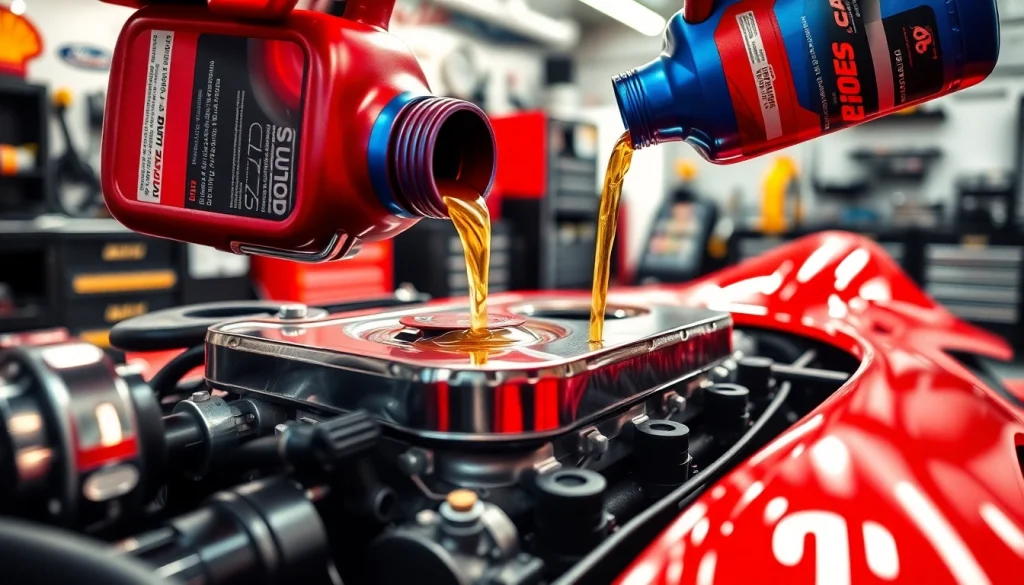How Racing Car Oil Enhances Performance and Engine Longevity

The Importance of Racing Car Oil
In the world of motorsports, the performance of racing cars is heavily dependent on the quality of the oil used in their engines. Racing car oil plays a crucial role not only in enhancing engine performance but also in ensuring longevity. It’s essential for car enthusiasts and racing professionals alike to understand the unique characteristics of racing car oil and how it differs from conventional engine oils. This article explores why racing car oil is so vital for engine health, what factors influence its effectiveness, and how to choose the right oil for optimal performance.
Why Racing Car Oil Matters for Engine Health
The primary function of any motor oil, including racing car oil, is to lubricate the engine components, reducing friction and wear during operation. In a racing environment, engines are subjected to extreme conditions including high RPMs, elevated temperatures, and heavy loads. Racing car oils are specifically formulated to meet these intense demands. They contain specialized additives that help maintain viscosity under extreme conditions, preventing breakdown and ensuring that the oil continues to perform effectively throughout a race.
The Role of Viscosity in Racing Conditions
Viscosity is a critical property of racing car oil, as it determines how well the oil flows at various temperatures. Racing car oils are designed with varying viscosity levels to accommodate the specific needs of different racing environments. For instance, a lower viscosity oil may be ideal for high RPM engines, allowing for quick lubrication during rapid acceleration, while a higher viscosity oil may be necessary to protect engine components under intense heat. Understanding the viscosity ratings and selecting the appropriate oil can dramatically affect engine performance and longevity.
Comparing Racing Car Oil to Standard Motor Oil
While all engine oils serve to lubricate and protect engines, racing car oils are uniquely formulated for heightened performance compared to standard motor oils. Standard oils are typically designed for regular driving conditions and do not incorporate the same level of performance-enhancing additives or viscosity stability as racing oils. This distinction is critical; racing car oils often feature higher concentrations of anti-wear and friction-modifying additives, ensuring optimal performance, even in the most extreme racing scenarios.
Choosing the Right Racing Car Oil
Selecting the ideal racing car oil goes beyond simply choosing a brand. Various factors must be considered to match the oil with the specific needs of both the vehicle and the racing conditions. Understanding these key factors is imperative for anyone looking to optimize their racing performance.
Key Factors in Selecting Racing Car Oil
When selecting racing car oil, several key factors must be taken into account:
- Engine Type: The type of engine — whether it is naturally aspirated, turbocharged, or supercharged — will influence the choice of oil.
- Racing Discipline: Different forms of racing, be it drag racing, road racing, or endurance racing, impose various demands on the engine and oil.
- Operating Temperature: Assessing the typical operating temperature during races can guide the selection of oil viscosity.
- Manufacturer Recommendations: Following recommendations from engine manufacturers and oil producers can provide a baseline for selecting suitable oils.
Differences Between Synthetic and Conventional Oils
One of the crucial decisions in choosing racing car oil is whether to opt for synthetic or conventional oil. Synthetic oils are chemically engineered to provide better performance and protection than conventional oils. They offer better viscosity stability at varying temperatures and superior protection against thermal degradation. While conventional oils may serve well for everyday applications, synthetic racing oils are essential for high-stress racing environments, as they provide consistent protection and performance reliability.
Understanding API and SAE Ratings for Racing Oil
API (American Petroleum Institute) and SAE (Society of Automotive Engineers) ratings are critical metrics for evaluating motor oils. API ratings indicate the oil’s performance characteristics, while SAE ratings indicate the oil’s viscosity grade. Recognizing these ratings can assist racers in selecting oils that meet or exceed performance standards, ensuring that they’re using the best product to protect their engine during the demands of racing.
Optimal Oil Change Intervals for Racing Cars
Just as it is crucial to choose the right racing car oil, knowing when to change that oil is equally important for maintaining performance and engine health. Unlike standard vehicles, racing cars operate under rigorous conditions that necessitate more frequent oil changes.
How Often Should You Change Racing Car Oil?
The frequency of oil changes for racing cars can vary significantly. Many racing teams recommend changing oil after every race, especially in high-performance scenarios. This ensures that any contaminants, combustion by-products, and breakdown products are removed effectively, preserving engine integrity and performance. Planning oil changes as part of a vehicle’s maintenance routine can significantly enhance reliability on the track.
Signs That Your Racing Oil Needs Changing
In addition to scheduled oil changes, it is essential to watch for signs indicating that the oil is due for replacement. Common indicators can include:
- Color Change: New oil typically appears amber; dark or sludgy oil may indicate contamination.
- Engine Noise: Increased engine noise can signify inadequate lubrication, suggesting the oil is losing its effectiveness.
- Oil Pressure Variations: Fluctuating oil pressure readings can be a sign of oil fatigue, requiring immediate attention.
Impact of Oil Change Frequency on Performance
Regularly changing racing car oil not only preserves engine health but also enhances performance. Fresh oil ensures that the engine is adequately lubricated, leading to improved horsepower, better fuel efficiency, and lower operating temperatures. Neglecting oil changes can lead to engine wear, reduced power output, and, ultimately, costly repairs. Investing time and resources into maintaining optimal oil conditions is paramount for any racing enthusiast.
Performance Testing and Racing Car Oil
The formulation of racing car oil is no accident; it undergoes rigorous testing to ensure it can perform under the extreme conditions experienced on the racetrack. This section will discuss how these oils are tested and the metrics that should be monitored for optimal performance.
How Racing Car Oil is Tested in Real Conditions
Racing car oils are tested under real-world racing conditions before being released to the market. This includes testing in field conditions, performance trials, and simulations that mimic various racing scenarios. Various factors, including temperature resilience, moisture control, and lubricant longevity, are evaluated to ensure the oil can withstand the demands of competition.
Performance Metrics to Monitor
To ensure the optimal performance of racing car oil, several metrics should be monitored during use:
- Viscosity Stability: Ensure oil maintains its viscosity over time and under varying temperatures.
- Oxidation Resistance: Monitor how well the oil resists breakdown when exposed to high temperatures and pressures.
- Wear Protection: Assess the oil’s ability to protect engine components from wear, ensuring longevity.
Case Studies of Oil Performance in Racing Events
Various case studies demonstrate the impact of high-quality racing oils on performance during professional racing events. For instance, during a notable endurance race, one team implemented a synthetic racing oil that offered superior viscosity stability even after several hours of intense racing. The result was not only a podium finish but also the engine’s integrity remained uncompromised, showcasing how oil performance can directly influence a racing outcome.
Future Trends in Racing Car Oil Technology
The development of racing car oil is an ongoing process, driven by advancements in technology and the increasing demands of motorsport. The following trends are expected to shape the future of racing car oil.
Emerging Technologies in Synthetic Racing Oils
As research continues in synthetic oil formulations, emerging technologies are resulting in oils that outperform traditional options. Innovations such as advanced additive technologies promote better lubrication and engine protection, while new synthetic bases provide enhanced thermal stability and reduced volatility. These advancements pave the way for oils that can withstand more severe racing conditions while maximizing efficiency and performance.
Environmental Considerations in Oil Development
Sustainability is becoming increasingly relevant in all industries, including motorsports. Manufacturers are beginning to develop racing oils that are not only high-performance but also environmentally friendly. Biodegradable synthetic oils and oils derived from renewable resources are quickly gaining traction as the racing industry looks for ways to minimize its environmental impact while maintaining extraordinary performance.
How Innovations in Oil Technology Will Shape Racing
Innovation in oil technology will dictate the direction of racing performance in the coming years. With each leap in formulation, engineers can create oils that not only push the boundaries of engine performance but also ensure engines run cleaner and more efficiently. Advances in oil technology will likely lead to races characterized by higher speeds, improved fuel efficiency, and optimally protected engines, facilitating the evolution of motorsports as we know it.







